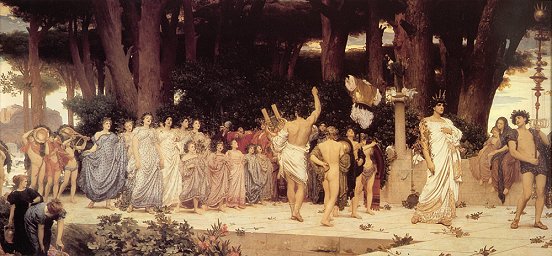
Lord Frederick Leighton, The Daphnephoria (1874-6), public domain image |
Greek Popular Religionby Martin P. Nilsson[1940] |

Lord Frederick Leighton, The Daphnephoria (1874-6), public domain image |
Greek Popular Religionby Martin P. Nilsson[1940] |
This is a short survey of Greek religious practice and beliefs from ground level. The texts of Homer, Hesiod, and the Greek dramatists and philosophers, who defined Greek beliefs, have long been known and understood. There is a conventional view of Greek mythology which is taught by rote to school children (at least until recently), which relies on a neat set of 'myths and legends.' It was not until the pioneering efforts of Jane Harrison and other scholars in the 19th century that a picture emerged of what actually constituted Greek religion, and how it evolved. This monograph covers what was known by the middle of the 20th century. It gives a fascinating look at the very earthy popular side of Greek religion, with its noisy (and often messy) festivals, initiations, secret societies, oracles, and a practical but very superstitious belief system. He also discusses how some of these beliefs and festivals, under the guise of Christianity, have persisted to this day.
--John B. Hare, November 8th, 2005
Index